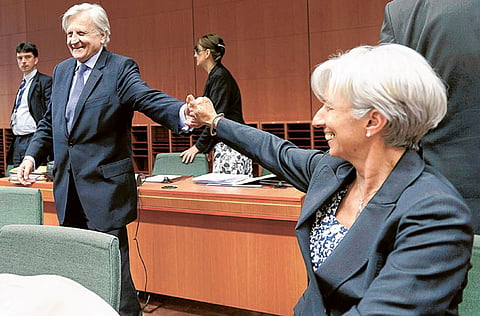No policy change after Strauss-Kahn
Economists dismiss fears that IMF policy may be affected by arrest of IMF chief

Dubai: A change of leadership at the International Monetary Fund (IMF) is unlikely to result in a shift in policy in the long term, Middle East-based economists have told Gulf News.
They have dismissed fears that ongoing negotiations over the euro crisis and other existing IMF programmes could be affected by the arrest and anticipated departure of IMF chief Dominique Strauss-Kahn on sexual assault charges in the US.
"The IMF will find another managing director and they will continue," said John Sfakianakis, chief economist at Banque Saudi Fransi in Riyadh.
"I think the importance of Strauss-Kahn is being overplayed. It is not a personal element that drives the IMF, it is the institution, its shareholders and its board members."
His views were echoed on Monday in Brussels, where European ministers were meeting to discuss financial aid for Portugal and Greece, with an IMF spokesman telling reporters that it was business as usual at the fund. John Lipsky, Strauss-Kahn's former number two at the IMF, has been appointed acting managing director, but has declined to comment on his new role, Bloomberg reported yesterday.
"I would like to reassure public opinion, the markets and the press, there's absolutely no question: decisions which are underway will not be impacted and this will not have an impact on the programmes being applied," Commission spokesman Amadeu Altafaj said.
The IMF, he added, "remains a strong institution as it always has been and there will be full continuity".
Strauss-Kahn has developed a reputation in recent years of ‘softening' the approach of the IMF to bailouts and financial aid, cutting back on the number of conditions imposed on nations that seek support, but Giyas Gokkent, chief economist at the National Bank of Abu Dhabi, said he did not expect a major change in tack.
"A lot of the people who are at the IMF have been there for a long time. There is continuity in terms of policy and I don't think that is because of a single individual. There is a reason why things have evolved the way that they have," he said.
"This is an institution at the end of the day. I don't think [recent events] will affect the way the IMF does things. At the point in time that we are in, there is a need for IMF resources and the IMF will be the key to the global economic recovery," he added.



